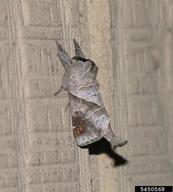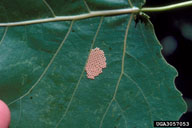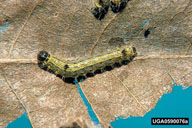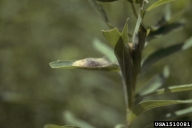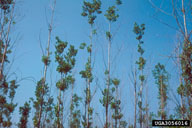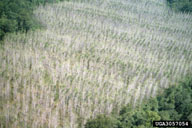Poplar tentmaker
Clostera inclusa (Hübner) Lepidoptera: Notodontidae)
Orientation to pest
Poplar tentmaker, Clostera inclusa (Hübner), is a native notodontid moth that feeds on poplar (Populus) and willow (Salix) and is found from southern Canada to Georgia, and west to Colorado. Adults fly from March to July in the southern United States and from July to August in the northern part of its U.S. range. Eggs are laid in clusters on the undersides of leaves. Larvae are gregarious and live in tents, which they construct by webbing together the edges of several leaves. The larvae feed through the growing season and move to the ground in late fall, where they pupate in loose cocoons and spend the winter. There are one or two generations per year, depending on the location. Small groups of open-grown trees may be defoliated.
Hosts commonly attacked
This caterpillar feeds on poplar (Populus) and willow (Salix).
Distribution
Poplar tentmaker is found from southern Canada to Georgia, west to Colorado.
Images of poplar tentmaker
| Figure 1. Adult of poplar tentmaker, Clostera inclusa | Figure 2. Egg mass of poplar tentmaker | Figure 3. Mature larvae of poplar tentmaker |
| Figure 4. Cocoon of poplar tentmaker | Figure 5. Poplars defoliated by poplar tentmaker | Figure 6. Stand of eastern cottonwood (Populus deltoides ssp. deltoides Bartram ex Marsh.) defoliated by poplar tentmaker |
Important biological control agents related to this pest species
Ladybird beetles may consume the eggs of this species.
Web links for information on poplar tentmaker
- Bulletin | L.L. Hyche, Auburn University
- IPM of Midwest Landscapes Fact Sheet | University of Minnesota
Articles
- Solomon, J. D. and F. L. Oliveria. 1993. Evaluation of poplar tentmaker defoliation on growth and survival of older cottonwood plantations. Research Paper - Southern Forest Experiment Station, USDA Forest Service (SO-271), 1993, 6 pp.
